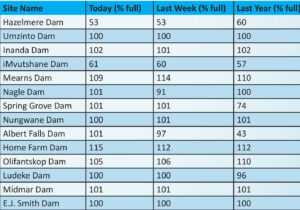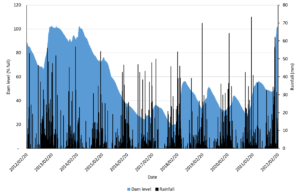[vc_row][vc_column][vc_column_text]Too much rain – is this the end of our water problems?
By Mlungisi Shabalala, 04 February 2022
The 2021/22 summer season has been relatively wet, with many parts of the KwaZulu-Natal province experiencing high rainfall volumes, resulting in flooding. These range from short-lived flash floods to destructive events which resulted in the loss of life, livelihood and infrastructure in various parts of the province. As a result of this rainfall, many rivers in the province have maintained high water levels and most dams are overflowing. At the moment (February 2022), almost all dams that are managed by uMngeni-uThukela Water are full. Only the iMvutshane and Hazelmere dams are below 100% of full supply capacity, due to construction works at these sites. With most of the dams overflowing and rivers reaching levels that have not been witnessed in the recent past, is this the end of our water problems?

Table 1: uMngeni-uThukela Water Dam levels on 04 February 2022 relative to the previous week and a similar time last year.
In many areas, people have witnessed water flowing in streams that had no flow for several years and bridges that were designed for small events have been eroded by the high flow volumes in rivers. This shows that the current rainfall season has become a ‘rare event’ in the recent past. Even the massive Katse Dam (with a capacity of about 2 billion cubic metres) in Lesotho (supplying water to the Gauteng province) is overflowing for the first time in a decade! One may think that the current season represents a change of fortune and we will no longer be faced with water problems. However, if history is anything to go by, this period of excess rainfall should be used as an indicator for potentially drier years in the near future.
For example, the Albert Falls Dam, which is the largest dam in the Mgeni System, has reached full capacity for the first time since 2014 (Figure 1). Rather than thinking that our problems are over, we should shift our thinking to imagining another eight years of low dam levels, and what that could mean when the demand is higher due to growing populations. In fact, water demand already exceeds available supply in many of our systems. For example, the yield of the Mgeni System is 400 million cubic metres per annum (MCM/a), while the demand is 470 MCM/a.

Figure 1: Storage level and rainfall at the Albert Falls Dam for the last 10 years (2012-2022).
From a water resources management perspective, the 2021/22 summer season has delivered some good rainfall and, based on current forecasts, more rainfall can be expected in the next two months. Good rainfall and dam levels at the end of summer are good for water supply during the drier winter period. However, what the following summer season will look like is unknown! Climate change projections have predicted long hot and dry spells with sparse high-intensity rainfall events between them in South Africa. This is representative of the trajectory of the Albert Falls Dam and many other large dams in the country. Therefore, if the climate change projections are anything to go by, our water problems are not over! It remains important to efficiently manage, conserve and protect this scarce and precious resource. A good rainfall season could be an opportunity to reduce household water bills. For example, users can look at investing in household rainwater harvesting tools to capture and store rainwater for non-potable household uses as an option.
With the demand already exceeding available water supply in uMngeni-uThukela Water’s area of operation, it is important for municipalities and water users to participate in efficient management of this scarce resource. Initiatives such as infrastructure upgrades and maintenance, as well as fixing leaks, could help to reduce the pressure on water resources and ensure more sustainable supply. Lastly, some devastating graphics showing human beings and vehicles being drowned in rivers in some parts of the KwaZulu-Natal province have been circulating on various social media platforms. These unfortunate events can and should be avoided if we refrain from attempting to cross rivers or bridges when water is overflowing. It is better to be late at work than risking your life or hard-earned goods![/vc_column_text][/vc_column][/vc_row]








